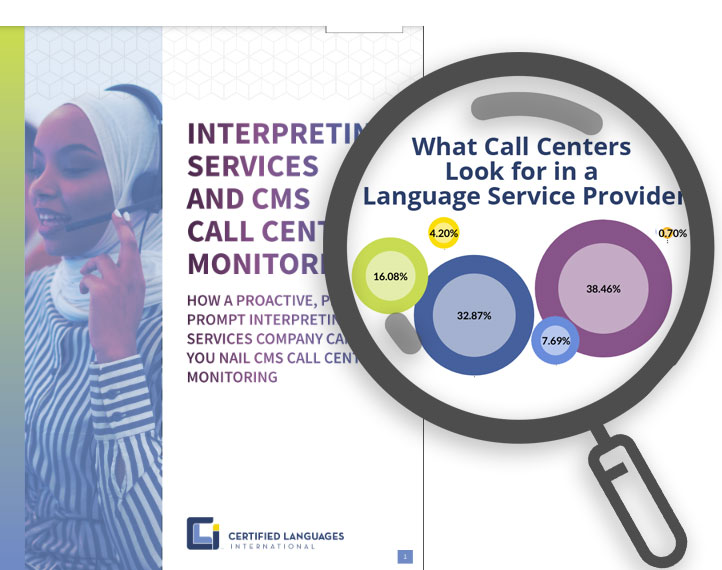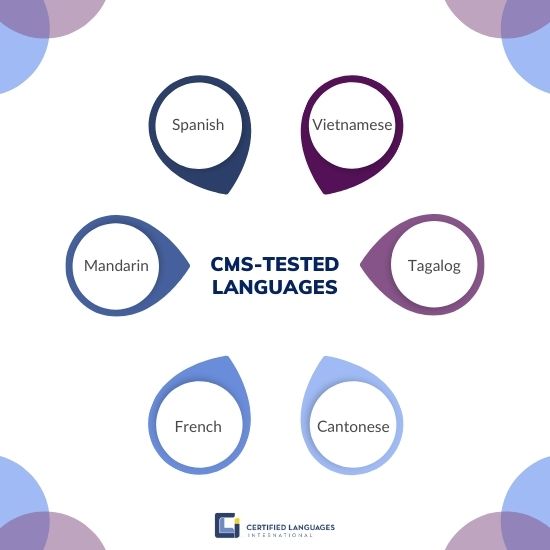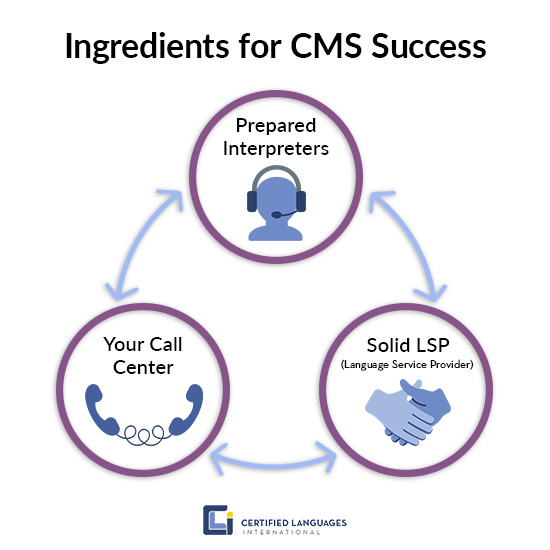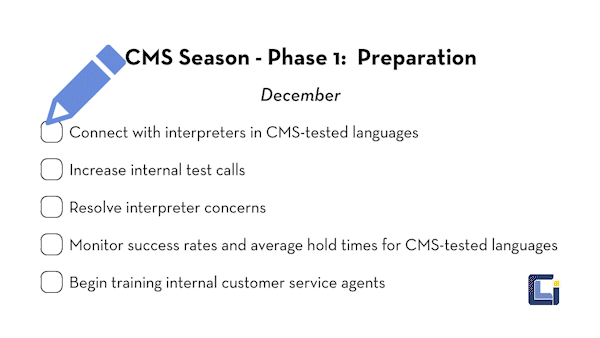In a Time Crunch? Grab the Guide now.

Download our slimmed down guide that's still packed with important need-to-know info on CMS call center monitoring and foreign-language interpreters. It covers:
- What the heck star ratings for health plans are
- How interpreting fits in
- Finding a top-notch language services provider for 5-star success
What are CMS star ratings for Medicare health plans?
The Centers for Medicare & Medicaid Services (CMS) developed its 5-star rating system to measure the quality of CMS’s Medicare Advantage (MA) Plans and Medicare Prescription Drug Plans (Part C and Part D, respectively).
The ratings are published every year right before Open Enrollment. This gives beneficiaries a chance to compare and contrast plans in their area before making a choice.
Performance measures are used to determine a plan’s quality rating (a.k.a. a star rating from 1–5). One star means the health plan performed poorly on these measures, 3 stars is average, whereas 5 stars means the plan excelled.
Why CMS star ratings are important to health plans
Showcasing quality to beneficiaries isn’t the only reason a plan wants a high score, however.
In addition to measuring the quality of a health plan, in 2012, as part of the Affordable Care Act, CMS ushered in quality bonus payments (QBPs) and MA rebates based on Medicare star ratings.
Both rebates and QBPs incentivize plans to perform better on quality measures.

|
Quality Bonus PaymentsThe bonus payment increases the revenue a plan will receive, and are a percentage added to the MA benchmark. QBPs are directly related to a plan’s star rating. For example, plans that have a star rating of 4 or higher get a QBP of 5%, while plans with 3.5 or fewer stars receive no bonus payments. |

|
MA RebatesA health plan will receive a rebate if their bid amount (i.e., the amount the plan expects it will cost to provide traditional Medicare services in a particular area) is below the MA benchmark (i.e., the amount CMS sets for each service area). Plans that have a high star rating and bid below the MA benchmark receive a higher rebate percentage. Rebates must be given back to the beneficiary in the form of a benefit, like lower premiums. |
How language access fits into star ratings
Both Part C and D plans have domains dedicated to customer service. The customer service domains each have measures for foreign-language interpreter and TTY availability.
To determine a plan’s compliance on these measures, CMS conducts what they call the Accuracy & Accessibility Study.
This is where your interpreter services partner enters the equation.
Accuracy & Accessibility Study
The Accuracy & Accessibility Study is conducted every year from around February to June.
A CMS auditor (a.k.a the test caller or “secret shopper”) will place a call to your health plan’s call center.
For the foreign-language component, the call will be conducted in one of six languages: Spanish, Vietnamese, Mandarin, Tagalog, French, or Cantonese.
The CMS auditor looks at two values:
- How successfully your call center agents connect foreign-language interpreters and TTY operators, and
- How accurately information is conveyed to the beneficiary from the interpreter.

The first value is complete when the health plan connects to an interpreter and answers the first “Star Question” within 8 minutes. CMS tabulates overall accessibility by dividing the number of successful contacts to a foreign-language interpreting or TTY operator by the number of total attempts.
The test caller will then ask a series of 3 questions from a program of 18–20 questions predefined each year.
The second value grades the accuracy of information provided by the agent and interpreter; each question must be answered accurately within 7 minutes.
Let's get cookin'
Now that we’ve established what CMS star ratings are, the financial ramifications, and the importance of interpreting and CMS call center monitoring, let’s look at what parts are needed for a successful testing season:
- Prepared interpreters
The accuracy of the information relayed to the non-English-speaking beneficiary rests on the shoulders of an interpreter. Their preparation is key.
- A solid interpreting services partner
Supplying foreign-language interpreters in all CMS-test languages would be challenging for a single health plan to do on their own. Interpreting services providers can, though! They also help ensure interpreters in CMS-tested languages know the proper terminology, and your agents are getting connected quickly to an interpreter.
- Your call center and agents
Fielding CMS test calls can feel a little awkward and … well, scripted. Luckily, there’s plenty you can do to ensure your call center and agents are ready to expertly navigate them. Let’s take a closer look at each.

The Prepared Interpreter
The Accuracy & Accessibility Study requires interpreters to be concise, quick, and, above all else, accurate
To do this effectively, interpreters must take notes, be familiar with the terminology, free themselves from distractions, focus, and know when to transparently ask for repetition.
Essentially, they have to do what they do during every single call they take: follow interpreter protocol.
That’s not everything, of course. But we hope it makes you feel a slight sense of relief that 99% of what makes a successful call an interpreter already does countless times a day.
Here are other ways interpreters prepare.
They use their resources wisely
Out-of-pocket costs. Deductible. Copay.
Ask a native English speaker to define these, and we bet some would have trouble. So how do interpreters accurately handle the rendition of these not-so-often-used terms?
They study them, keep detailed notes, and use their resources constantly.
“I translate all uncomfortable terms or questions into Vietnamese,” said one of CLI’s experienced CMS interpreters. “I print them out and keep them within reach, ready for calls.”
Others have noted that they set aside time each day to look up unfamiliar words, understand their meaning, and think about how they would translate them.
They know how to manage test-taking anxiety
CMS test calls can be challenging for many interpreters because of the complex terminology and the “test” nature of the call itself. It’s a lot of pressure!
“My initial thought when I recognize that it’s a CMS test call is always, ‘No, not this again,’” jokes French interpreter Holly. But “it’s been important for me to move past thoughts like this by acknowledging that test anxiety is normal and by having compassion for myself.”
Other interpreters use prep as a way to lessen their CMS anxiety. Taking some time to review CMS-related materials both before and after can help bolster confidence over time.
The most successful, experienced interpreters readily use glossaries, translation websites, and their own cheat sheets to their advantage during these calls.
Having resources available can help interpreters adapt to any situation within a call, and can make the most challenging barrier to effective communication easier — and less stressful — to get through.
More interpreter advice:
- A big ol’ cuppa before taking calls
- Breaks and meditation
- A good night’s rest
- Debriefing sessions after calls to look up unfamiliar terms
- Deep breaths
- Playing with fidget toys to keep stress down

“We must look at everything we do through the lens of health equity, because when the system doesn’t work, it’s those individuals with complex health and social needs who fall through the cracks.”
Meena Seshamani, MD, PhD, Deputy Administrator & Director, Center for Medicare, Centers for Medicare & Medicaid Services; Elizabeth Fowler, PhD, JD, Deputy Administrator and Director of the Center for Medicare and Medicaid Innovation (CMS Innovation Center); and Chiquita Brooks-LaSure, Administrator for the Centers for Medicare and Medicaid Services (CMS)
Interpreters who assist on CMS tests calls never forget the purpose of these calls — to assist REAL limited English proficient (LEP) beneficiaries with REAL health coverage concerns.
They deserve this information to be accurately presented to them, in their native language. And interpreters know firsthand how helpful their knowledge and skills really are.
“I have a friend who has been on and off dialysis for years now, and has gone through three different kidney transplants,” stated French interpreter Holly. “It’s been a tough road for her, but if it weren’t for Medicare, she may not have made it this far.”
A Solid Language Services Provider
All language service providers (LSPs) share a few things in common
They have software and systems to connect remote interpreters with the clients they serve, they provide telephone interpreters in hundreds of languages, and they all promise to provide top-notch customer service no matter what.
But CMS test calls aren’t like normal calls.
A lot is riding on your call center’s performance. So extra coordination and care are necessary to make the process go smoothly. And that takes an LSP that’s willing to go the distance.
Finding a stellar interpreting services provider for CMS call center monitoring boils down to three things:
- Preparation
- Being proactive
- Communication
How prepared is your LSP?
You, more than anyone, know that planning for CMS takes work. And time. And it’s not a one-and-done, begin-the-night-before-it-starts kind of deal.
Your interpretation provider’s efforts need to reflect your own. For you to succeed, the right interpreting company will not leave anything to chance, and will have a thorough planning process just for CMS testing season in place.
For example, we have a 3-phase CMS prep plan that runs year-round.

How proactive is your LSP?
Proactivity and planning for CMS go hand in hand. If you notice something amiss while going through your preparations, or your colleague comes up with a brilliant idea to train your agents, you change course.
That’s how it should be with your LSP and CMS. They should always be refining and tuning their preparations and looking for ways to make sure your agents get an interpreter in a CMS-test language quickly.
If they see a rise in connection times to Vietnamese, are they actively recruiting more interpreters? If an interpreter isn’t remembering the Medicare-specific terminology, are they removed from the CMS test call pool?
Whatever the case, the LSP you choose shouldn’t rest on their laurels. They should always be looking to lower your connection time, fulfill your requests at a higher percentage, and make sure the interpreters they work with are up to speed.
Is your LSP communicative?
Stuff happens, even during CMS test season.
A call will take too long. An interpreter will not interpret with 100% accuracy. There won’t be any Tagalog interpreters available the second you need one.
The issue isn’t if a problem will arise; the issue is if your interpreting partner addresses the problem.
“You simply can’t go wrong with too much communication,” states Doriana McGraw, director of Interpreter Services at CLI.
If your LSP does not respond to your questions or quickly get back to you with details about any concerns you have, you might want to reconsider your relationship. You don’t want to be left hanging in critical moments when call center monitoring is in full swing.
LSPs that have experience working with clients affected by CMS call center monitoring know the stakes involved and will get back to you ASAP.
They also have options for weekly calibration meetings specifically to address concerns. They don’t send your call to voicemail, but answer, listen, and actively try to correct what isn’t working.
Questions to ask your interpreting services provider
You now know what to look for in an interpreting service provider. Next you’ll want to get a list of questions together to suss out if they have the right mix of knowledge, process, and experience you’ll need for secret shopper calls.
We’ve put together a template below to guide you.
Questions to determine how your LSP prepares interpreters, clients, and staff for CMS calls:
- What’s your familiarity with CMS regulations and Medicare Part C & D star ratings?
- What do you consider best practices for your clients to meet CMS requirements?
- How and when do you start preparing for the CMS testing period?
- How do you ensure your interpreters accurately interpret CMS questions?
- Can you provide any references from your CMS clients?
Questions to ask to determine how communicative they are:
- What’s your process for concerns with CMS calls?
- What type and frequency of reporting do you provide on metrics such as language, average connection time, total call duration, service issues, etc.?
- What level of support do you provide for your clients around CMS test call season?
- How do you communicate with your interpreters to help them understand CMS requirements and protocols?
Questions to ask to determine how proactive they are:
- What are your success rates and average connection times in each CMS language?
- What’s your process to monitor interpreter availability, connection times, and accuracy of CMS calls?
- How do you ensure you have enough interpreters in the core CMS languages?
- How do you keep up with changes to CMS star rating guidelines?
- Do you have an internal CMS specialist or a team specializing in CMS?
- Do you have systems in place to identify and prioritize calls regulated by CMS?
Your Call Center Agents
Make your call center a secret shopper fortress
If all you needed for CMS call center monitoring was to partner with an experienced LSP that works with qualified foreign-language interpreters, you’d be halfway to the Bahamas by now. You could set the operation to autopilot and bask under the sun, drink in hand.
But we all know it’s not that easy. Your agents play an important role in timeliness and answering beneficiary questions, and that responsibility lies on the processes you put in place.
Some recommendations for you:
- Task a dedicated employee with staying current on CMS’s policies and Health Plan Management System (HPMS) memos.
- Verify your current and prospective enrollee toll-free beneficiary call center numbers, toll-free pharmacy help desk numbers, and current and prospective enrollee toll-free TTY numbers. CMS pulls phone numbers from the HPMS list weekly; inaccurate phone numbers can cause organizations to receive poor results on the measures.
- Periodically review your call center’s internal processes, policies, and training protocols to make sure they’re up-to-date and reflect best practices. For example, do your agents document the prospective beneficiary’s preferred language on their records? This can create a more seamless interaction so the agent immediately knows when they’ll need to connect an interpreter.
- Ask your LSP to establish a phone line dedicated to your CMS calls to improve your ability to monitor those calls.
- Throughout the testing period, adequately staff your call center during CMS-designated “usual business hours” so your agents can promptly answer test calls without a queue building up.
- Implement an internal monitoring program. Conduct and audit your own CMS test calls (or contract with a third party) to verify that every call your agents handle — regardless of whether or not the beneficiary needs an interpreter — is up to par.
How to set your agents up for success
You’ll want everyone — from your supervisors to your agents — to be on the same page with training about CMS requirements, what to expect during test calls, and how to most efficiently connect to and conduct calls with interpreters. It’s especially important that your agents are prepared because they’re on the front line of support for your beneficiaries.

|
Establish expectationsClarify your agents’ roles, goals, and performance expectations so they know exactly what’s expected of them and how they can contribute during CMS’s Accuracy & Accessibility Study. |

|
Set a reminderRemind your agents of when the test calls will take place so they don’t get caught off guard receiving calls that might feel repetitive or scripted. |

|
Provide supportEnsure your agents have enough support during calls. That support could mean everything from a clear escalation path for questions, to supervisors on hand who can dispense guidance, to training materials they can refer to as needed. |

|
Inform your agentsFurnish them with informational scripts to help answer beneficiary questions — regardless of whether an interpreter is needed. |

|
Go over how to access an interpreterMake sure your agents have all available info they’ll need to request an interpreter. Also make sure they’re comfortable communicating with a non-English-speaking caller through an interpreter. It’s not always an intuitive interaction, so a refresher training can’t hurt! |

|
Don’t ignore burnoutHappy agents are effective agents. Make them feel appreciated and supported while reducing their stress in the call center. For example, reward high performance and excellent customer service; offer opportunities for advancement and new skill development; cultivate a positive work environment, employee engagement, and a cooperative rapport among colleagues; and promote good time management techniques. |
CMS is a large government-run organization that’s responsible for overseeing healthcare coverage through Medicare, Medicaid, the Children’s Health Insurance Program (CHIP), and the Health Insurance Marketplace.
This means the agency manages quality programs across different healthcare sectors that Medicare touches, like nursing homes, hospitals, and clinical laboratories, to name a few.
While one might assume the distinctions between these quality programs would be obvious, CMS doesn’t do anyone any favors by using similar language to describe each initiative.
So if you’re searching for “CMS star ratings,” you will run across sites for Medicare health plan star ratings, hospital star ratings, and nursing home star ratings. It gets confusing quickly!
To help you on your journey, we’ve put together a list of CMS quality programs you may be looking for that aren’t related to health plans.
One helpful note: foreign-language interpreters are unique to Medicare star ratings for health plans. No other star rating or quality program from CMS needs the direct assistance of an interpreter. However, this doesn’t mean that providing interpretation services to your patients won’t help up those quality scores across other measures (like patient satisfaction).
These programs were developed to help patients and caregivers compare facilities and providers to make the best possible decision on care for themselves or their family. This information is delivered publicly via Medicare’s Care Compare website.
For hospitals: Hospital Quality Star Ratings Program
For nursing homes: Five-Star Quality Rating System
For home health providers: Home Health Star Ratings
For hospice providers:
-
- CAHPS Hospice Survey Star Ratings (a new program with data released August 2022)
- CAHPS Hospice Survey Star Ratings FAQ
For long-term care providers: Long-Term Care Hospital (LTCH) Quality Reporting Program (QRP)
For inpatient rehab facilities: Inpatient Rehabilitation Facility (IRF) Quality Reporting Program (QRP)
